Himbos in Peril: The Boxer-Briefs Horror of David DeCoteau
 Friday, October 30, 2020 at 7:29PM
Friday, October 30, 2020 at 7:29PM by Patrick Gratton
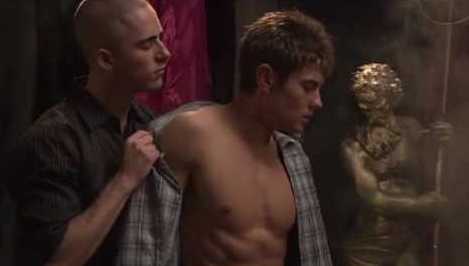
Marcus Hobson’s body trembled as he felt an external power take control. “Is this what enlightenment feels like?” Nothing’s been the same since the night he met Jaspen Frasier, the president of Omega Alpha Psy. Marcus never saw himself pledging. But that all changed with a single touch, as Jaspen confided in Marcus the secrets of his success. This holy ointment, was god’s, or the devil’s, gift to man to reclaim eternal power. The veil that set him back had been lifted, everything was within his grasp. Exhilarated, he wanted to be free to possess whatever his will desired. He basked in his beauty. His modesty had withered away, he felt free, free of the confines of his mind and soul. What mind? What soul? Little did Marcus know that those were withering away as well.
This is an excerpt from a synopsis of the David DeCoteau film The Brotherhood VII: The Ascension. Or is it? Does the film actually exist? I might have made it up but does it matter? With a filmography whose imagery and plots are so indistinguishably alike, as to make the audience's mind as foggy as the hunky protagonists, who is there really to say?
As a self-described “Gay Roger Corman”, the prolific DeCoteau has 160+ directorial credits to his name. It’s rare to find a filmmaker with such a large output, delving into so many various genres, with such limited social imprint. Despite his success working with B-Movie Mogul Charles Band, DeCoteau’s name is barely mentioned, even within the halls of the queer horror canon...
If I was to do a posterized highlighting DeCoteau’s career the groupings would be as follows: grindhouse horror, gay pornography, T&A sci-fi comedies, Skinemax soft-core straight pornography, a brief failed attempt at mainstream filmmaking, homoerotic horror/science-fiction films, talking animals family films, and Lifetime Channel thrillers. It’s unfathomable to think that both Sorority Babes and the Slimeball Bowl-O-Rama and A Talking Pony!? share the same director, but here we are.
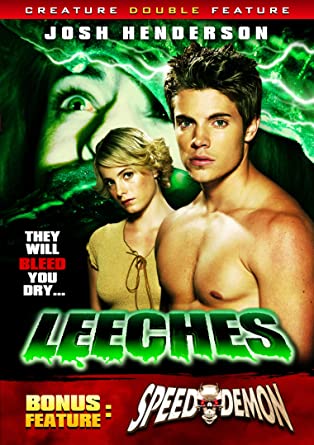 From 1998 to 2015, the majority of DeCoteau’s output would be lobbed into the Homoerotic Horror/Science-Fiction grouping, or as I liked to classify it, the Boxer-Briefs Horror grouping. If you’ve seen 1 of his 40+ boxer-briefs horrors, you’ve seen them all. Most of the films riff off populist entertainment of the time: First Stab was a riff on Wes Craven’s Scream, Speed Demon was a riff on Rob Cohen’s The Fast and the Furious, Leeches! was a riff on creature features, etc. The pillars of his tried and true formula remained relatively the same. The protagonist is a late teen to twenty something male, an outsider, forced to face-off against a supernatural entity. Over the course of the film, the protagonist is coupled up with a token female character, seduced by said supernatural entity, spends a large amount of time in various states of undress, with the inclusion of a boxer-briefs clad sacred ritual popping up as a major narrative set piece. The supporting cast, more often than not populated by white male twinks, are either possessed by demons or killed off for suspense purposes, and the narrative ends with the protagonist tricking and vanquishing the demon before DeCoteau ends his film on an ill-advised pun or comedic beat. These films are often accompanied by a Garage Band generated score, a ticking heartbeat affect used ad nauseum, overblown lightning and thunder effects, harsh camera work, slow-motion beefcake shots, laughable day for night shooting, with a lighting choice that screams “lets triple down on the dark blue,” or simply no lighting configuration at all.
From 1998 to 2015, the majority of DeCoteau’s output would be lobbed into the Homoerotic Horror/Science-Fiction grouping, or as I liked to classify it, the Boxer-Briefs Horror grouping. If you’ve seen 1 of his 40+ boxer-briefs horrors, you’ve seen them all. Most of the films riff off populist entertainment of the time: First Stab was a riff on Wes Craven’s Scream, Speed Demon was a riff on Rob Cohen’s The Fast and the Furious, Leeches! was a riff on creature features, etc. The pillars of his tried and true formula remained relatively the same. The protagonist is a late teen to twenty something male, an outsider, forced to face-off against a supernatural entity. Over the course of the film, the protagonist is coupled up with a token female character, seduced by said supernatural entity, spends a large amount of time in various states of undress, with the inclusion of a boxer-briefs clad sacred ritual popping up as a major narrative set piece. The supporting cast, more often than not populated by white male twinks, are either possessed by demons or killed off for suspense purposes, and the narrative ends with the protagonist tricking and vanquishing the demon before DeCoteau ends his film on an ill-advised pun or comedic beat. These films are often accompanied by a Garage Band generated score, a ticking heartbeat affect used ad nauseum, overblown lightning and thunder effects, harsh camera work, slow-motion beefcake shots, laughable day for night shooting, with a lighting choice that screams “lets triple down on the dark blue,” or simply no lighting configuration at all.
It’s not just that the framework of DeCoteau’s films are essentially gay porn without the actual sex. Nine times out of ten, his films are homoeroticism without any... well... eroticism. His films are NIFTY erotic story rejects adapted to the screen. There’s an apparent laziness to DeCoteau’s erotic storytelling, as if he’s resting solely on the appeal of its cast of underwear-clad Abercrombie & Fitch model/actors. In a DeCoteau world, self-pleasure consists of whimpering in bed while groping one’s pectoral and abdominal muscles, the twinky or twunky protagonists humping the air while their hands roam across their own torsos. This happens a lot in DeCoteau’s work.
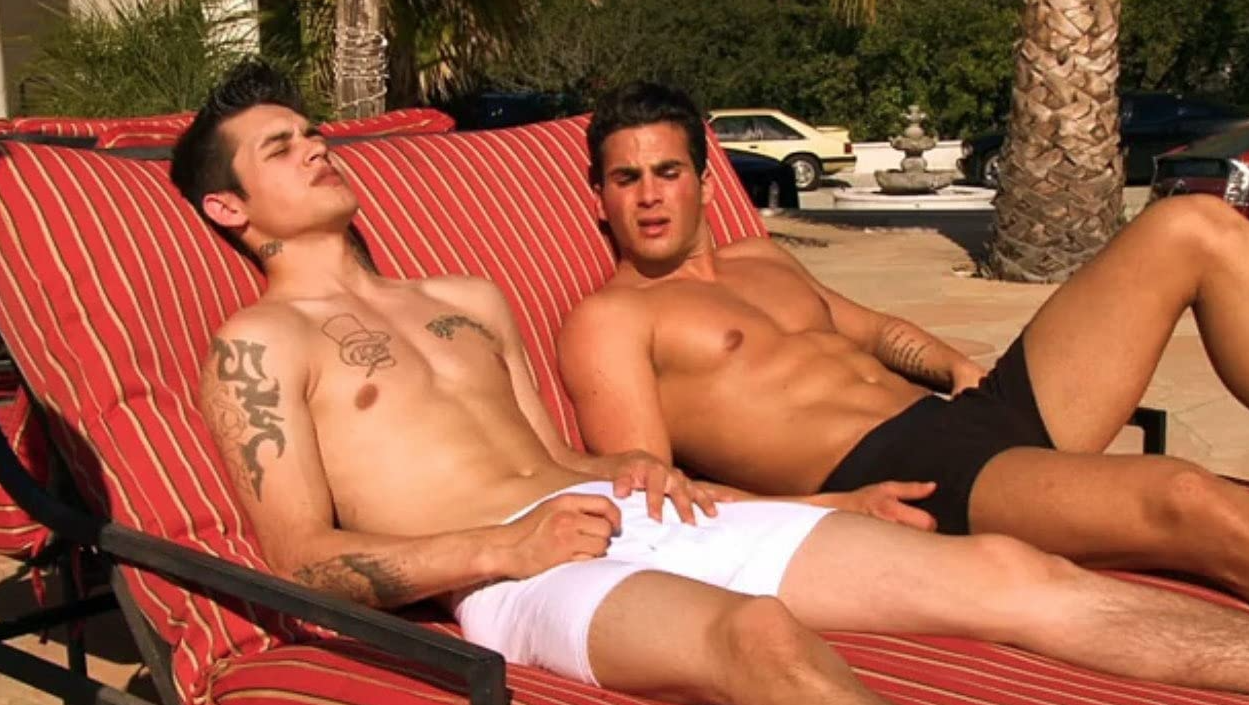
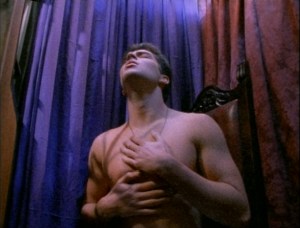 Voodoo Academy
Voodoo Academy
In DeCoteau's Voodoo Academy, our hero Christopher Sawyer (Riley Smith) has recently enrolled into the Carmichael Bible College, a new age religious group that blends faith with science, run by the malicious Mrs. Bouvier (Debra Mayer) and her lackey Rev Carmichael (Chad Burris). After the student body gets served a glass of red wine during supper, Christopher wakes up during the middle of the night to find his dormmates in a trancelike state. Said glass of wine wasn’t no mere glass of wine, but a himbo juice of sorts, wiping the young men’s minds clean, succumbing to Bouvier’s and Carmichael’s wills. The film cuts between close-ups of an astonished Christopher and medium shots of the various other young men whimpering and feeling themselves up in bed. Once observing his dormmates, the camera takes the place of a voyeur titillated by the sights, pushing into their semi-chiseled bodies. But who is the voyeur? Surely it's a money shot for the audience’s enjoyment, but the actors’ gestures are so unnatural and stylized that it reads as homoerotic parody. The crosscutting clearly states that it’s from Christopher’s POV, and the number of cuts between him and the six other men make him out to be lusting over the sight. However, lusting over his cohorts is entirely out of character for a man who’s one distinguishable quality is that he’s an undisguisable white straight male.
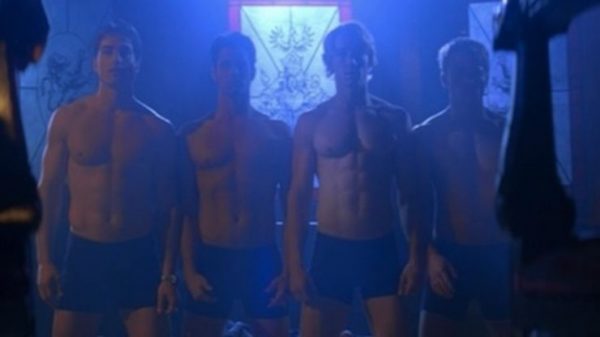
Look, I’ll be the first one to admit that I enjoy shameless beefcake objectification, especially in a genre that more often than not solely objectifies its female characters. There’s an enjoyment to watching himbos get terrorized, especially when terrorized in states of undress. But DeCoteau does it in such a roundabout fashion that he nullifies the enjoyment. The morning after the trance, Christopher presses a fellow student on what happened the night before, by describing what he saw as his cohorts “having a nightmare”, never really identifying the severity of what he saw. These homoerotic set pieces happen in a vacuum, bearing no narrative weight or payoff. The characters, and therefore the text, are oblivious to their own homoerotic nature.
DeCoteau has a queer representation problem within his work. For all of the countless beefcake shots there’s an emptiness to DeCoteau’s gay male gaze, especially given the gaze is rarely represented within his films’ diegetic story world. There’s an insidious straight codedness that permeates DeCoteau’s work, with the exception of his trilogy of Edgar Allen Poe adaptations for HERE TV, but that’s another story for another time. These are homoerotic events that happen within strictly heteronormative story worlds.
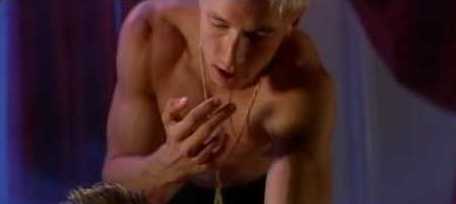 Brotherhood 1
Brotherhood 1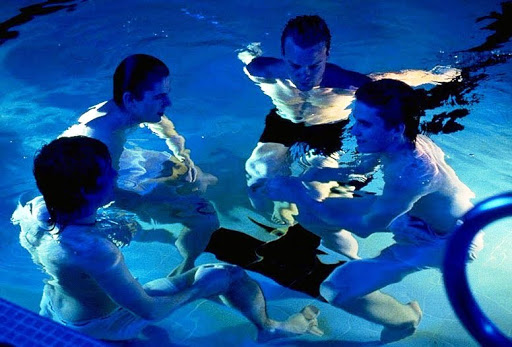 Brotherhood 2
Brotherhood 2
Let’s take, for example, the first two entries in DeCoteau’s Brotherhood franchise. Both plotlines are certified copies of one another. In the first our hero Chris (Sam Page) is seduced by a coven of vampires, while in the second our hero John (Sean Faris) is seduced by Luc (Forrest Cochran) to form a coven of wizards. Both films treat the growing friendship/rivalry between the hero and villain as the film’s primary relationship. Both films feature identical setpieces where the villain leads the hero into a compromising ménage-a-trois with an unnamed female student. This female participant is a cinematic beard. The villain disrobes the hero, down to his boxer-briefs of course, manipulating him and guiding him to the female form. Like a serpent, the hero mounts the third participant, kissing her, caressing her breasts, giving the camera an ample amount of time to pull back, framing his lens around the bouncing boxer-briefs clad buttocks. The sequel even goes further, when Luke weirdly leads John’s head to the woman’s vagina, guiding him to remove her undergarments with his teeth. All this is done in the name of throwing some estrogen into the mix, wiping the film’s hands clean of the fear of breaching above the surface of subtext into full blown gay text territory.
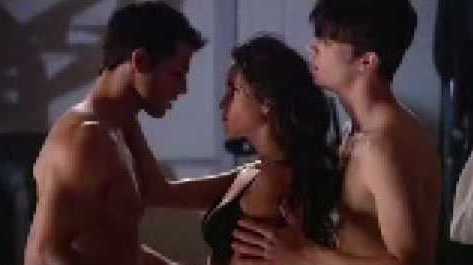 Brotherhood V
Brotherhood V
It wasn’t until eight years later, in the franchise’s fifth instalment The Brotherhood V: Alumni, that DeCouteau depicted actual queer characters. In this case, bisexuals Randal (Brett Novak) and Ted (Arthur Napiontek) have an extended love scene in their former high school weight room. By 'extended,' I mean lethargic pacing and stilted blocking. The whole scene reads as cumbersome gay-for-pay acting, lacking an ounce of sensuality and as always, the scene has no narrative weight and is never spoken of again. Even DeCoteau’s treatment of phallic symbolism, whether it’s the avenger’s knife in Beastly Boyz or the supernatural leeches in Leeches!, is done in such a dull manner that the sensuality is thrown right out of the window.
Maybe a lot of DeCoteau’s reluctance and inability to portray queerness in his work stems from his coming up the ranks as a schlocky horror filmmaker. During an interview for Dead for Filth with Michael Varrati, DeCoteau talks about his early days working with Band at Full Moon Entertainment, having to hide his homosexuality and submerging the subtext of his work.
Voodoo Academy was initially pitched as a “horror movie for girls” and a starring vehicle for Band’s girlfriend at the time, Debra Mayer. At the time, the American horror industry mostly closed its doors to queeer voices. Gay horror didn’t exist in the early aughts, and DeCoteau never adjusted his formula once it was set in stone during that time period. It’s indicative of the industry’s homophobia and the restriction of resources given to him as a filmmaker that his highest budgeted, and most fully realized film, Puppet Master III: Toulon’s Revenge, had no queer subtext whatsoever.
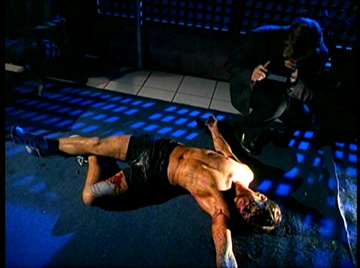 Curse of the Puppet Master
Curse of the Puppet Master
On some rare occasions, filmmakers are given the rare opportunity to queer up a horror franchise. The most famous example of this is Jack Sholder’s A Nightmare on Elm Street II: Freddy’s Revenge. Another example is DeCouteau’s return to the Puppet Master franchise, almost a decade after the triumphant success of Toulon’s Revenge, with 1998’s The Curse of the Puppet Master. The comparisons between both horror sequels seems like a perfect end point, distilling DeCoteau’s failing as a queer genre storyteller. DeCoteau is an out gay filmmaker, while the team behind the Elm Street sequel consisted of straight white men. Neither franchise had delved into the realm of queer subtext before. Earlier I said Toulon’s Revenge lacked all fiber of queer subtext; Curse of The Puppet Master reads as nothing but homoerotic. Curse follows mild mannered gas jockey Robert ‘Tanks” Winsley (Josh Green) as he's being groomed by Dr. Magrew (George Peck) as the Puppet Master’s newest apprentice. Sholder’s Elm Street sequel flips gender tropes, giving birth to Jesse Walsh (Mark Patton), the horror industry’s first male scream queen, fighting off Freddy Krueger’s (Robert Englund) quest to possess his body. Curse of the Puppet Master’s greatest benefit is that it applies DeCoteau’s sensibilities and tropes to maximum effect. Tank’s objectification doesn't read as commonplace, considering the franchise's history. It feels surprising, new, fun, even a bit dangerous. Tank is essentially DeCoteau’s first himbo protagonist, too soft-spoken and dim-witted to realize the sinister intentions at hand. There’s a vulnerability to Green’s presence, a vulnerability that DeCoteau is never able to duplicate. Magrew’s grooming of Tank, the way he obsesses over their mentorship, feels queer in natrure. He’s predatory enough to fill the shoes of a villain toeing the line without coming across as an offensive stereotype.
Yet, DeCoteau runs into the same problems, as the film’s queerness only remains surface level. It’s skin deep titillation, whereas despite the orientation of its creators, Freddy’s Revenge is neck deep in gay subtext. It speaks to Jesse’s nature, a terrified young man coming to terms with himself and the horrors of pubescent queer wet dreams. The film also treats its signature villain Freddie as a manifestation of hidden queer desires. Even comparing the films’ production design, the Elm Street sequel has a queerer element to it. Curse feels like it was shot at the cheapest Santa Monica plaza money can buy. Freddy’s Revenge surrounds itself with early 80s gay iconography, whether it be a leather bar, locker room showers, a play on high school coach fetishes or S&M fetishes.
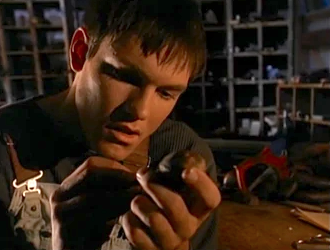
Same goes for the casting of the films’ leads: while they both share vulnerable presences, Josh Green feels like he’s just came off a DeCoteau twunk assembly line, while Patton has an androgynous physique, with those voluptuous hips, that set him apart from the stereotypical horror lead. Patton has a sense of authenticity, like a queer kid figuring out his place in the world. For better or for worse, Freddy’s Revenge gushes out with the teenage fear of realizing one’s queerness while Curse of the Puppet Master rests on the pleasure of its easy on the eyes himbo lead.



Reader Comments (9)
His best three films are "The Brotherhood" (2001) which has very hot three way scene between two guys and girl which teases with bisexual action. "Leeches"(2003) works both as cute boys in underpants horror and traditional creature feature movie. "Voodo Academy" about hidden desires in Bible College never goes beyond cute shirtless guys rubbing themselves. DeCoteau also made the serious comedy " Leather Jacket Love Story" (1997) about a twink who falls for an older daddy type- that one features an orgy with familiar porn film faces. The prolific DeCoteau got his start working in the adult film industry. Yes I am a fan and he does have a great eye for young masculine beauty
i will forever be thankful to David Decoteau for introducing me to Bradley Stryker - in The Brotherhood AND Final Stab.
I love Leather Jacket Love Story.
They’re on Brotherhood VII now!? I have some catching up to do. My favorite DeCoteau might actually be his least homoerotic, Sorority Babes at the Slimeball Bowl-O-Rama.
I saw one ("The Raven"). My only memory of it is that at the end, I told myself, "well, I'm not going to watch any more of these." Going back, just now, I see I gave it a 1 out of 10 on IMDB. I think I've given less than a dozen films a 1 in the twenty-something years I've been rating the films I watch on that site.... Just terrible.
He is very prolific and even makes family films like "A Talking Cat" - and even in those he manages to have at least one cute boy takes off his shirt scene- the man in a genius!
Yeah, cute guys in briefs are always nice to look at but man his movies suck.
Cool article. These movies are more interesting to talk about than they are to actually watch - the few I've tried to watch didn't really hold my attention. Though weirdly this Halloween season I did find out that one of these, "Killer Bash", starred a young Cory Monteith.
Anyone here knows if Charles Band was an executive producer in the first two "Brotherhood" movies? IMDb lists these two movies in Band's filmography, but I am not sure about it. "The Brotherhood" was made by David DeCoteau's own company (Rapid Hearts Pictures) and it seems that he was trying to do things by himself, after more than 20 movies made for Band.